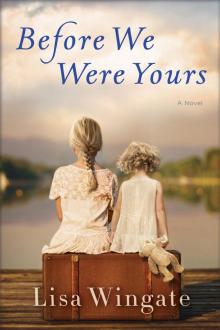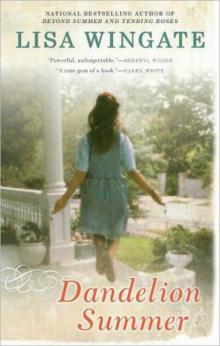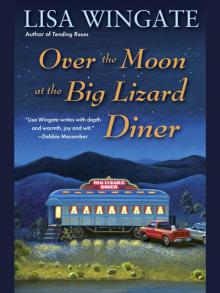- Home
- Lisa Wingate
The Summer Kitchen
The Summer Kitchen Read online
Table of Contents
Title Page
Copyright Page
Dedication
Acknowledgements
Chapter 1 - SandraKaye
Chapter 2 - Cass
Chapter 3 - SandraKaye
Chapter 4 - Cass
Chapter 5 - SandraKaye
Chapter 6 - Cass
Chapter 7 - SandraKaye
Chapter 8 - Cass
Chapter 9 - SandraKaye
Chapter 10 - Cass
Chapter 11 - SandraKaye
Chapter 12 - Cass
Chapter 13 - SandraKaye
Chapter 14 - Cass
Chapter 15 - SandraKaye
Chapter 16 - Cass
Chapter 17 - SandraKaye
Chapter 18 - Cass
Chapter 19 - SandraKaye
Chapter 20 - Cass
Chapter 21 - SandraKaye
Chapter 22 - Cass
Chapter 23 - SandraKaye
Chapter 24 - Cass
Chapter 25 - SandraKaye
Teaser chapter
Praise for Lisa Wingate’s Accent Novels
A Thousand Voices
“Wingate paints a riveting picture of the Choctaw Nation as one woman searches for the family she never knew. Heartfelt and revealing, Wingate’s latest proves that she’s a rising star in the world of women’s fiction.”
—Romantic Times (top pick)
“A delightful, heart-wrenching story written in first person with captivating characters, A Thousand Voices is sensitively told and masterfully written. It will capture the imagination of readers from the first page… . A Thousand Voices is a book not to be missed … [a] perfect 10.”
—Romance Reviews Today
“Lisa Wingate provides a warm character study of a fully developed individual seeking her roots.”—Midwest Book Review
Drenched in Light
“Heartfelt and moving, enriched by characters drawn with compassion and warmth.”—Jennifer Chiaverini
“Another winner.”—Booklist
The Language of Sycamores
“Heartfelt, honest, and entirely entertaining … this poignant story will touch your heart from the first page to the last.”—Kristin Hannah
Written by today’s freshest new talents and selected by New American Library, NAL Accent novels touch on subjects close to a woman’s heart, from friendship to family to finding our place in the world. The Conversation Guides included in each book are intended to enrich the individual reading experience, as well as encourage us to explore these topics together—because books, and life, are meant for sharing.
Visit us online at www.penguin.com.
“Wingate is an excellent storyteller who knows how to draw readers in quickly and keep them turning the pages, laughing one minute and grabbing for a tissue the next.”—The Lubbock Avalanche-Journal
“Wingate presents another one of her positive and uplifting books … tales in the midst of turmoil that are inspirational without being preachy.”
—Booklist
Good Hope Road
“A novel bursting with joy amidst crisis: small-town life is painted with scope and detail in the capable hands of a writer who understands longing, grief, and the landscape of a woman’s heart.”—Adriana Trigiani
“Wingate has written a genuinely heartwarming story about how a sense of possibility can be awakened in the aftermath of a tragedy to bring a community together and demonstrate the true American spirit.”—Booklist
Tending Roses
“A story at once gentle and powerful about the very old and the very young, and about the young woman who loves them all. Richly emotional and spiritual, Tending Roses affected me from the first page.”—Luanne Rice
“You can’t put it down without … taking a good look at your own life and how misplaced priorities might have led to missed opportunities. Tending Roses is an excellent read for any season, a celebration of the power of love.”
—El Paso Times
Praise for Lisa Wingate’s
“Texas Hill Country” Series
Over the Moon at the Big Lizard Diner
“A beautifully crafted and insightfully drawn page-turner … this is storytelling at its best.”—Julie Cannon
“A warmhearted tale of love and longing, grits and cowboys, horse psychology and dinosaur tracks.”—Claire Cook
“Wingate lets her magical Texas setting and idiosyncratic supporting characters shine.”—Kirkus Reviews
Lone Star Café
“A charmingly nostalgic treat… . Wingate handles the book’s strong spiritual element deftly, creating a novel that is sweetly inspirational but not saccharine.”—Publishers Weekly
“Lisa Wingate is making a national name for herself as an excellent storyteller. Her novels … are upbeat and refreshingly wholesome.”
—Abilene Reporter-News
“Leaves you feeling like you’ve danced the two-step across Texas.”
—Jodi Thomas
Texas Cooking
“Lisa Wingate writes with depth and warmth, joy and wit.”
—Debbie Macomber
“Texas Cooking … will have readers drooling for the next installment … [a] beautifully written mix of comedy, drama, cooking, and journalism.”
—The Dallas Morning News
“Takes the reader on a delightful journey into the most secret places of every woman’s heart.”—Catherine Anderson
“The story is a treasure. You will be swept along, refreshed and amused… . Give yourself a treat and read this tender, unusual story.”
—Dorothy Garlock
Other Novels by Lisa Wingate
The Blue Sky Hill Series
A Month of Summer
The Tending Roses Series
Tending Roses
Good Hope Road
The Language of Sycamores
Drenched in Light
A Thousand Voices
The Texas Hill Country Trilogy
Texas Cooking
Lone Star Café
Over the Moon at the Big Lizard Diner
NAL Accent
Published by New American Library, a division of
Penguin Group (USA) Inc., 375 Hudson Street,
New York, New York 10014, USA
Penguin Group (Canada), 90 Eglinton Avenue East, Suite 700, Toronto, Ontario M4P 2Y3, Canada (a division of Pearson Penguin Canada Inc.) Penguin Books Ltd., 80 Strand, London WC2R 0RL, England
Penguin Ireland, 25 St. Stephen’s Green, Dublin 2,
Ireland (a division of Penguin Books Ltd.)
Penguin Group (Australia), 250 Camberwell Road, Camberwell, Victoria 3124, Australia (a division of Pearson Australia Group Pty. Ltd.)
Penguin Books India Pvt. Ltd., 11 Community Centre, Panchsheel Park, New Delhi - 110 017, India
Penguin Group (NZ), 67 Apollo Drive, Rosedale, North Shore 0632, New Zealand (a division of Pearson New Zealand Ltd.)
Penguin Books (South Africa) (Pty.) Ltd., 24 Sturdee Avenue,
Rosebank, Johannesburg 2196, South Africa
Penguin Books Ltd., Registered Offices: 80 Strand, London WC2R 0RL, England
First published by NAL Accent, an imprint of New American Library, a division of Penguin Group (USA) Inc.
First Printing, July
Copyright © Wingate Media, LLC, 2009
Conversation Guide copyright © Penguin Group (USA) Inc., 2009
All rights reserved
REGISTERED TRADEMARK—MARCA REGISTRADA
LIBRARY OF CONGRESS CATALOGING-IN-PUBLICATION DATA:
Wingate, Lisa.
The summer kitchen/Lisa Wingate. p. cm.
eISBN : 978-1-101-06024-7
1. Bereavement—Psychological a
spects—Fiction. 2. Family—Fiction. 3. Runaways—Fiction.
4. City and town life—Fiction. 5. Intergenerational relations—Fiction. 6. Life change events—Fiction.
I. Title.
PS3573.I53165S86 2009
813’.54—dc22 2008053609
Set in Adobe Garamond
Without limiting the rights under copyright reserved above, no part of this publication may be reproduced, stored in or introduced into a retrieval system, or transmitted, in any form, or by any means (electronic, mechanical, photocopying, recording, or otherwise), without the prior written permission of both the copyright owner and the above publisher of this book.
PUBLISHER’S NOTE
This is a work of fiction. Names, characters, places, and incidents either are the product of the author’s imagination or are used fictitiously, and any resemblance to actual persons, living or dead, business establishments, events, or locales is entirely coincidental.
The publisher does not have any control over and does not assume any responsibility for author or third-party Web sites or their content.
The scanning, uploading, and distribution of this book via the Internet or via any other means without the permission of the publisher is illegal and punishable by law. Please purchase only authorized electronic editions, and do not participate in or encourage electronic piracy of copyrighted materials. Your support of the author’s rights is appreciated.
http://us.penguingroup.com
To those who serve
and those who are
served—
may we all see
that we walk in the
same circle.
Acknowledgments
The Summer Kitchen was inspired in great measure by real-life events, and so there are some real-life people to whom I owe a debt. To begin at the beginning, thank you to Judith for showing up at a book signing, telling me about The Gospel Cafe, and then being so kind as to take me there to see it for myself on a rainy spring day. To Sherry, Marsha, Curtis, and John, thanks for sharing the place with me and for taking time to answer questions and contribute ideas for the story. To the great folks in the kitchen, thanks for putting up with me as I learned the routine and asked more silly questions. May the sweet light of grace continue to shine down on you and your little blue house as you fill hearts and stomachs. To Ladelle Brown, thanks for sharing the story of your sandwich ministry. The tales about your “kids” helped to give faces to the children of Blue Sky Hill and to bring them to life.
On the practical side of things, my gratitude goes out to the fine folks at New American Library for doing the hard work that turns stories into books and dreams into reality. In particular, my thanks to my editor, Ellen Edwards; to Clair Zion and Kara Welsh; to all the folks in marketing and publicity at the Penguin Group, who bring the books to the shelves; and to Megan Swartz for being a great publicist. Thanks also to my agent, Claudia Cross, at Sterling Lord Literistic.
Closer to home, I’m grateful to my family and my community of reader friends, without whom none of this would be possible. Thanks to Sharon Mannion for tireless proofreading and to Janice Wingate for keeping up with newsletter lists. Gratitude also goes out to Ed Stevens for tireless encouragement and endless technical help with YouTube videos and other mind-boggling projects, and to Teresa Loman for being a hilarious long-distance gal pal and for starting my official fan club on Facebook. With you in it, any club would be a hoot, girlfriend!
Last, thanks once again to readers far and near who keep me writing and give my imaginary friends new mind places to travel to. Thank you for passing the books along to others, and for taking time to send notes, good wishes, and encouraging words. These adventures would be nothing without wonderful people to share them with.
May some measure of the joy you’ve given me be returned to you in this story.
Chapter 1
SandraKaye
Part of me says, It’s just a house. It’s wood, and brick, and stone, nails and tar paper, weathered red shingles, a few of which are missing now. It’s only a ramshackle old place that was never anything fancy.
With luck, developers will buy it and wait for revitalization to take over the block. A quick sale to a speculator would be the easiest way… .
The voice that says this is logical. It makes sense. It’s only telling me what I already know.
Which raises the question of why those words are so hard to hear.
There’s another voice, one that’s smaller and quieter, timid yet persistent, like a child with something to say. This is more than a house. This is the past. Your past… .
I’ve wondered time and again if those are the voices anyone would hear when saying good-bye to a treasured childhood place.
It’s nothing but a burden, I told myself as I stood in the driveway, waiting for the real estate agent to arrive. Maryanne was right. You should have done what she wanted. If I’d let my sister have her way, the house would have been put on the auction block, contents and all. In Maryanne’s view, the little bit it might bring wasn’t worth the effort of getting an agent and waiting for a buyer. It wasn’t as if Mother needed the money from her inheritance of the place. It wasn’t as if anyone cared what happened to Uncle Poppy’s house at all.
Anyone other than me. When the one person who always loved you the most dies a violent death, it’s hard to know what should come after. There is no road map for what should be done with the possessions left behind and the memories cut short. Mother had let the house languish for months on the premise that it wouldn’t look good to dispose of it while Poppy’s murder was still unsolved. Now that the Dallas Police Department had finally admitted the case might never be closed, six months became the socially acceptable benchmark. It was time to cut our losses, as Mother put it.
The words stuck in my chest, too hard to swallow even now that the real estate agent was on her way. The idea of tossing this place out like an empty shoe box seemed a betrayal of Poppy and Aunt Ruth, whose breath inhabited the fading pink house even now that the contents had been sold, the porches swept, the leftover junk piled at the curb. There was nothing more to do here but hang out a sign and let go. Yet the reality remained impossible to face. Standing in the drive, I expected that the front door would creak open, and Poppy would hobble out in his bowlegged shuffle. He’d smile, and wave, and tell me to come in for coffee. The last six months would be nothing but a bad dream, a nightmare from which we’d awaken all at once.
Turning from the door, I stared down the block. There was no way to be comfortable with the silence here, no way to make peace with the painful ending of Poppy’s life. I could go back a thousand times and wish I’d acquiesced when Mother and Maryanne wanted to move Poppy to a nursing home two years ago, after Aunt Ruth’s death, but wishing it wouldn’t change anything.
Checking my watch, I paced back and forth across the driveway. The real estate agent was a half hour late. Around me, the neighborhood had slipped into the filmy shade of evening, and even though it was warm, gooseflesh rose on my arms as a group of adolescent boys passed by on the sidewalk, their oversized shorts sagging beneath Tshirts in colors that were probably carefully selected to identify a group.
One of them kicked a plastic flowerpot from the edge of the estate sale rubbish pile. A flash of anger, hot and sudden, caused me to cry out, “Stop it!” The boys turned my way, and I fell mute, staring at them. In a few years, would they be the ones jumping an eighty-nine-year-old man whose only mistake was to have cashed his social security check before dropping by the convenience store for a gallon of milk? “Leave that alone,” I hissed, and hatred welled inside me. How dare those boys touch Poppy’s belongings. How dare they touch anything that had been his.
Shrugging, the closest one kicked the flowerpot again, then stepped around it and left it in the street. “Yeah, you in my neighborhood now, lady,” he muttered with false bravado, and his friends laughed. “You betta take yo’ butt back home befo’ dark.”
“Yeah, get in that Caddy and mojo on outa here,” another added, then slipped in a string of expletives without venturing a glance back at me.
I stood by the driveway, trapped between good sense and a blinding need to confront them.
This isn’t the way, I told myself. They’re just boys. Just little boys trying to impress each other, trying to act like men.
Poppy had always loved the kids in the neighborhood. For years, he’d fixed their bikes, patched leaking tire tubes and aired up deflated basketballs, tack welded the wheels onto broken skateboards, wagons, and tricycles. He probably knew those boys when they were younger… .
A new red Mustang passed them on the street, and they whistled at the blonde behind the wheel. She ignored them as she pulled into the driveway. “Kids,” she said as she stepped from her car. A high, quick laugh punctuated the sentence, and she rolled her eyes in a way meant to indicate that the boys were harmless. “I heard they’re trying to get some summer programs started up to keep young people off the streets when school gets out.”
“That’s good,” I said, but I didn’t ask who they were. I didn’t care. I wanted to be done with this meeting, get in my car, go home, and put a diet frozen dinner in the microwave. Rob was working ER tonight, and Christopher would be out with friends, studying. They’d both get home late, the usual routine. It was easiest for all of us, a way to avoid the fact that Poppy wouldn’t be calling to check in, and Jake wasn’t in his dorm at Southern Methodist University, but somewhere on the far side of the world, searching for a birth family he didn’t know anything about.
Nothing was the way it was supposed to be. The little pink house shouldn’t have been dark and silent. Poppy and Jake should have been inside with a bowl of popcorn, watching the Rangers play ball and cheering so loudly their voices would echo into the front yard. The two of them had loved to watch baseball together almost from the moment we adopted Jake and brought him home from Guatemala. Jake, silent and scared in a universe of strangers, had instantly latched on to Uncle Poppy. We supposed Poppy looked like someone Jake knew before—a grandparent, perhaps, or a worker in the orphanage.

 Before We Were Yours
Before We Were Yours A Sandy’s Seashell Shop Christmas
A Sandy’s Seashell Shop Christmas The Book of Lost Friends
The Book of Lost Friends Larkspur Cove
Larkspur Cove The Sea Glass Sisters
The Sea Glass Sisters The Language of Sycamores
The Language of Sycamores Dandelion Summer
Dandelion Summer Word Gets Around
Word Gets Around Beyond Summer
Beyond Summer Firefly Island
Firefly Island The Tidewater Sisters: Postlude to The Prayer Box
The Tidewater Sisters: Postlude to The Prayer Box Talk of the Town
Talk of the Town![Blue Sky Hill [01] A Month of Summer Read online](http://i1.bookreadfree.com/i1/03/29/blue_sky_hill_01_a_month_of_summer_preview.jpg) Blue Sky Hill [01] A Month of Summer
Blue Sky Hill [01] A Month of Summer A Thousand Voices
A Thousand Voices Over the Moon at the Big Lizard Diner
Over the Moon at the Big Lizard Diner Never Say Never
Never Say Never Good Hope Road
Good Hope Road The Summer Kitchen
The Summer Kitchen A Month of Summer
A Month of Summer Blue Moon Bay
Blue Moon Bay Drenched in Light
Drenched in Light The Sea Keeper's Daughters
The Sea Keeper's Daughters